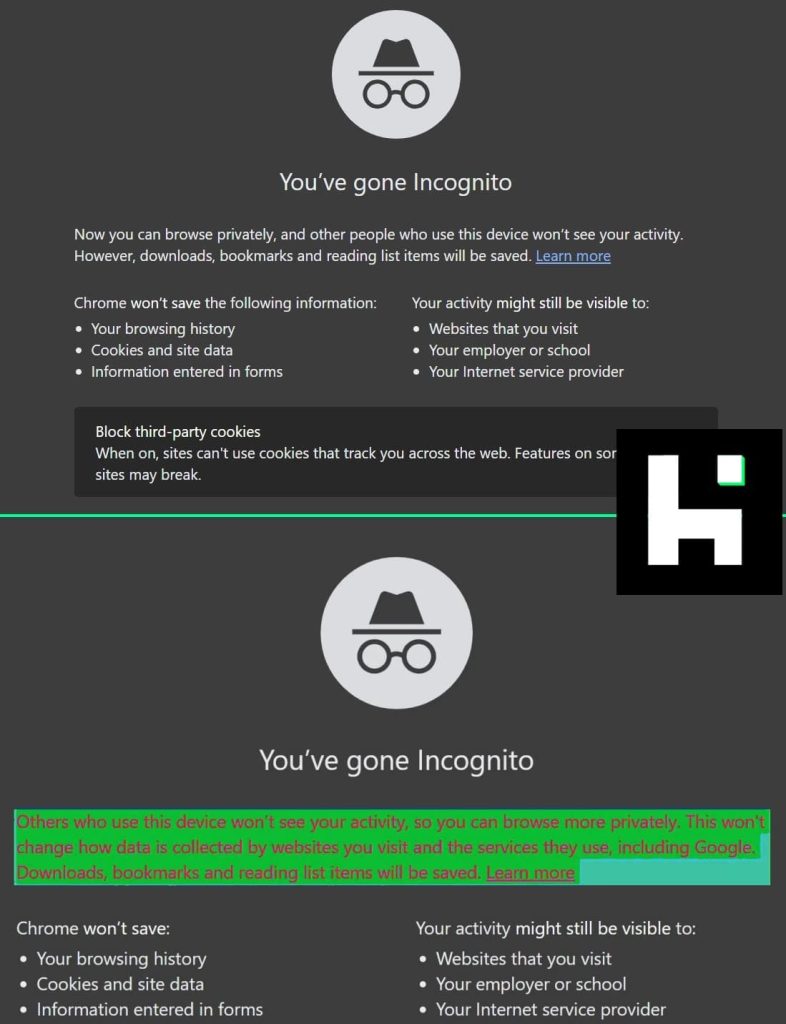[ad_1]
Google’s New Disclaimer Confuses Users with Data Collection Admission – It All Happened After the Company Had to Face a Whopping $5 Billion Lawsuit.
For years, “Go incognito” has been the whispered mantra for those seeking online privacy. Google Chrome’s private browsing mode promised a cloak of anonymity, letting users roam the web free from watchful eyes. But a recent lawsuit and a quiet update by Google have cast a shadow over this digital haven, raising questions about its effectiveness and the company’s commitment to user privacy.
Google’s New Disclaimer
Google has updated its Incognito mode ‘disclaimer’ to reflect its data collection practices, which were previously unnoticed and got the company into legal trouble. The Chrome Incognito mode disclaimer initially stated users could “browse privately,” but the new version claims more privacy.
The update was added to the Chrome Canary build, a version (122.0.6251.0) created for developers that includes experimental releases and is updated daily. The Incognito mode disclaimer previously stated:
“Now you can browse privately, and other people who use this device won’t see your activity. However, downloads, bookmarks, and reading list items will be saved.”
After the update in Canary, the disclaimer states the following:
“Others who use this device won’t see your activity, so you can browse more privately. This won’t change how data is collected by websites you visit and the services they use, including Google. Downloads, bookmarks, and reading list items will be saved.”

Both versions acknowledge that web activity may still be visible to sites, but the newer version informs users that websites, including Google, continue to collect browsing data in Incognito tabs, allowing tracking of Incognito users and Google users using Google services like Ad Manager and Analytics. Judge Yvonne Gonzalez Rogers cited this as a reason for ruling against Google’s motion for summary judgment in a privacy lawsuit.
For your information, in 2020, Google faced a $5 billion class action lawsuit for collecting user data through its services in Incognito Mode. The lawsuit alleged that Google tracked sensitive user data, such as browsing history, device data, and IP addresses even when users believed they were surfing privately.
Google initially dismissed the allegations, but US District Judge Lucy Koh disagreed, stating that Google never explicitly informed users about its continued data collection. The company then stated that the websites collect data in this mode, but the disclaimer does not mention it.
Google redesigned its Incognito mode pages, but this has not been enough. The company, thus, had to agree to pay $5 billion in settlement in December 2023, expected to be presented for court approval by February 24, 2024. It also reworded the disclaimer and changed everything else except the first paragraph to appear more transparent about data collection practices in Incognito mode.
Google has added disclaimers to Chrome Canary on Android, Windows, and other platforms when users open a new incognito tab/window. It is worth noting that Incognito mode is not anonymous, and third-party cookie tracking prevention is enabled by default to protect user activity. Still, the case highlights the need for more transparent data collection practices, particularly in sensitive features like Incognito mode, by tech giants like Google.
For insights into this, we reached out to John Bambenek, President at Bambenek Consulting. “Incognito mode, and its equivalent, to other browsers, has never offered much more privacy protection than people hiding their web viewing habits from their parents or partners,” John argued.
“This lawsuit highlights that this mode doesn’t offer much in the way of privacy at all. While organizations were concerned about what third parties might be collecting about their employees or their workplace, they should be focusing on migrating to privacy-centric, browsers, and using browsing plug-ins that prevent websites from collecting data in the first place,” he advised.
What Does All This Mean?
So, what does this mean for the web-weary wanderer? First, a dose of realism: incognito mode is not magic. Embrace its limitations, and consider alternative tools for truly sensitive web journeys. Second, demand more transparency. Google’s quiet update, while a step in the right direction, pales in comparison to the need for clear, comprehensive explanations of data collection practices.
Ultimately, the battle for online privacy is far from over. Google’s incognito update is a small victory, a flicker of light in the ever-growing digital surveillance landscape. But the fight for truly private browsing, for a web where anonymity isn’t an illusion, continues.
The onus lies on users to stay informed, to demand accountability, and to push for technological solutions that respect our right to digital discretion. Only then can the internet become a space where “incognito” truly means unseen, unheard, and ultimately, free?
RELATED ARTICLES
- $4 billion lawsuit claim Google tracked iPhone users’ activity
- Google Facing Lawsuit Over Tracking Users in Incognito Mode
- Microsoft sued for alleged misuse of stolen Dark Web credentials
- Dutch Watchdog Sues Adobe Over Mass Collection of Citizen Data
- DuckDuckGo study claims Google Incognito searches are not private
[ad_2]
Source link
